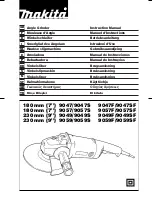
16
www.raider.bg
all face mask, eye protection or goggles. If necessary, work with breathing mask, silencers
(hearing protectors), work shoes or special apron that protects you from work to dislodge
small particles. Your eyes must be protected from flying into the working area of particles.
Dust mask or a breathing filter dust arising from work. If you are exposed for long periods of
loud noise, this can lead to hearing loss.
6.9. Beware others to be a safe distance from work area. Anyone who is in the work area
must wear personal protective equipment. Break off pieces of the work piece or work tool may
result in a strong acceleration to fly away and cause damage well beyond the working area.
6.10. If you perform activities which threaten to fall working tool of hidden wires under
tension or affect the power cord, hold power only isolated handles. When entering the working
tool in contact with the wires under tension, it is transmitted through the grinding metal parts,
and this may lead to electric shock.
6.11. Keep the power cords a safe distance from rotating work tools. If you lose control of
the grinding, the cable can be cut or fascinated by the working tool and it can cause injuries
6.12. Never leave grinders before working tools to completely stop its rotation. Rotary tool
can touch the object, resulting in losing control of the grinding machine.
6.13. While transport your angle grinder, do not let on. Accidental touch your clothing or
hair can be swept from the working tool, with the result that the working tool may be hurt your
body.
6.14. Regularly clean the vent on your angle grinder. Turbine motor of dust sucked into the
body, and the accumulation of metal powder increases the risk of electric shock.
6.15. Do not use grinders near flammable materials. Flying sparks can cause the ignition
of such materials.
6.16. Do not use the work tools that require the application of coolant. Use of water or other
coolant can cause electric shock.
7. Recoil and tips for avoiding it.
7.1. Kickback is the sudden reaction of the machine following a wedge or blocks the rotating
working tool, for example abrasive disc, rubber subjected disk wire brush and others. Wedge
or block leads to sharp braking of the rotation of the working tool grinders consequently
receives strong acceleration in the direction opposite to the direction of rotation of the tool
at the point of blocking, and became unmanageable. If for example block abrasive disk or
block in the processing device, the edge of the disc, which touches the work piece may be the
disc to bend and break or recoil occurs. In this case, the disk is accelerated to working with
machinery or in the opposite direction, depending on the direction of rotation of the disc and
place of the wedge. In such cases, abrasive discs and can break. Recoil occurs as a result of
improper or incorrect use of angle grinders. Its occurrence can be prevented with appropriate
protective measures described below.
7.2. Keep grinding hard and keep hands and body in such a position that can withstand
the eventuality of a kick. If a grinding auxiliary handle, always use it to control it better in
recoil or the emergence of reactionary moments in time of inclusion. If the pre-take the proper
precautions in the event of recoil or strong reaction times can master the machine.
7.3. Never put your hands near the rotary working tools. If the kick occurs, the instrument
can make you hurt.
7.4. Avoid stand in the area where it would bounce angle grinder in the event of kickback.
Kick the machine moves in a direction opposite to the direction of movement of the working
tool in the area of blockage.
7.5. Work with great caution in the areas of corners, sharp edges and others. Avoid
repulsion or wedge of working tools in the work piece. When handling sharp corners or sharp
edges or repel the rotating working tool there is increased danger of wedge. This causes a
loss of control of machinery or recoil.
7.6. Do not use a chain or toothed cutting sheets. Such work tools often cause recoil or loss
of control over grinding.
8. Specific instructions for the safe operation of grinding or cutting with abrasive disks
















































